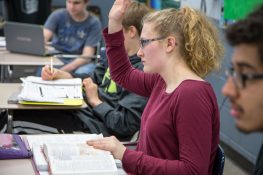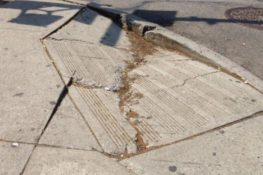CIDNY’s youth transition program for youth with disabilities helps high school or college students plan their transition into adult life. We use the Next Step program, a six to nine week curriculum to teach students the soft skills needed for success. These include effective communication, managing a budget, and how to advocate for themselves as they continue on to college and the working world.
For students who want to work right after high school, we help them prepare their resumes, learn how to interview, and give them an opportunity to interact in a work environment. We treat the classroom like a workplace, with teachers as bosses or supervisors and classmates as fellow co-workers. Students are taught how to speak and act with different people.
M.D., a high school student in Queens, was very quiet and tended to mumble when answering questions at the start of the program. As the Next Step program progressed, he started sounding more confident when answering questions. At the mock interview workshop towards the end of the program, he came dressed for an interview, spoke clearly, and was prepared to answer questions about himself. M.D. said he’s interested “in rapping” but also “in mechanics or painting (like contractor work.)” He’s now enrolled in a vocational program at Co-op Tech.
For youth with disabilities who see college as an option, we provide information on how to prepare for it. Activities create an awareness of the laws that exist to protect people with disabilities. This is critical for successful independent living.
The Next Step program’s workshops and presentations are tailored to the needs of the youth with disabilities we serve. We provide support so they can start their life after high school or college with confidence and awareness of the laws that protect people with disabilities.
In the 2016-2017 school year, we delivered the Next Step program workshops to 126 youth with disabilities in nine different high schools, including a residential school in Queens. We also helped 18 college students at two Queens area colleges. With the help of ASL interpreters, the Next Step program was also delivered to a group of six Deaf students during the summer.
CIDNY’s youth transition program is gearing up to deliver workplace readiness and/or college preparation workshops for the new school year.
For more information, please contact Shireen Khan at skhan@cidny.org or 646-442-1521.
You might also enjoy this video featuring the Director of CIDNY Queens, Don Rickenbaugh, sharing his advice for youth with disabilities.




